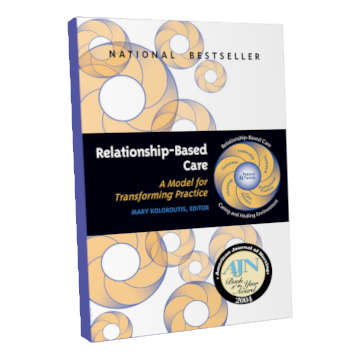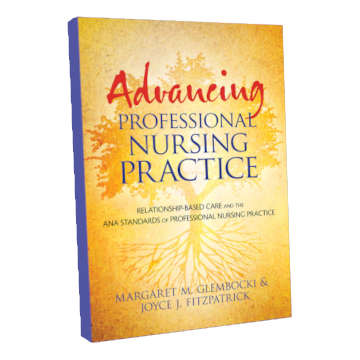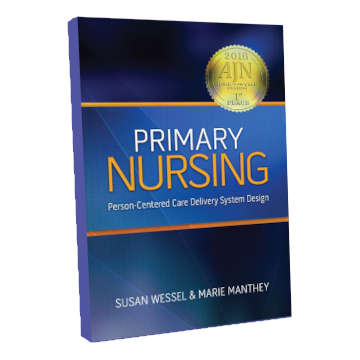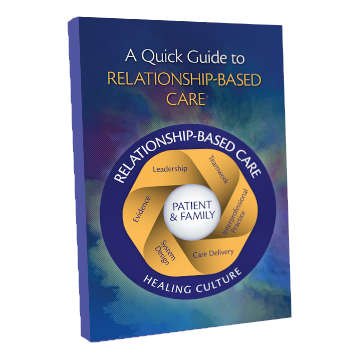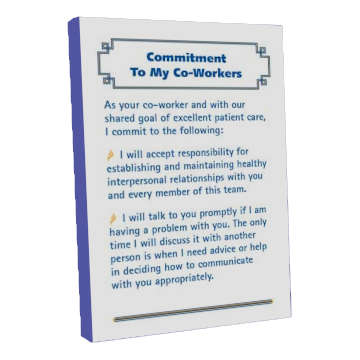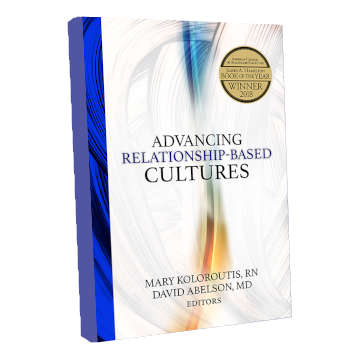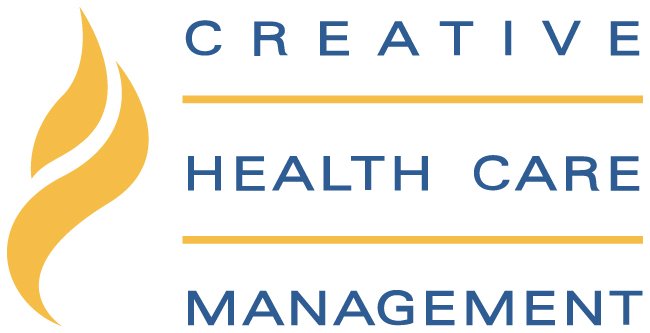3 Simple Practices to Strengthen Every Relationship
You’ve probably heard the statistic that nearly 70% of people are disengaged at work. In fact, there is a good chance you might be struggling to stay engaged, too. We spend nearly a quarter of our lives working. And let’s face it, how we feel about our work impacts every other part of our life. There is no magic compartment we can put work into when we leave our office, clinic or unit. It only makes sense to figure out how we can make our work life meaningful and positive.
Relationship-Based Care suggests that there are three key relationships that are important for you to understand because they can improve every aspect of your work: relationship with self, relationships with team members, and relationships with patients and families (Koloroutis, 2004, pp. 5-6).
It is intentional that relationship with self is first, followed by relationships with teammates, and finally relationships with patients and families. Relationship with self starts with tuning into yourself and is foundational to every other relationship. Strong, trusting team relationships, require individuals who are self-aware, and able to manage their behaviors and emotions. And high-quality relationships with patients and families require relationships that individuals have both with themselves and their teams.
3 ways to bring your best selves to work and strengthen relationships with team members, patients, and families.
#1 Tune in to Yourself
Understanding who you are when you are at your best requires tuning in to yourself. You might, for example, be able to rattle off roles that you occupy: clinician, nurse, dad, brother, neighbor—but these are only labels. What tuning into yourself requires is checking in on a deeper level, specifically noticing your mood, your outlook, whether you are distracted or present, when you are feeling hopeful or discouraged and why.
This kind of tuning in to yourself calls for slowing down and paying attention to what fulfills you and what depletes you. To build a better understanding of what is fulfilling try this activity.
Try this: Three Good Things
TIME REQUIRED: 10 minutes/day for at least one week.
HOW TO DO IT: Each day for at least two weeks, write down three things that went well for you that day and think about your unique contribution to why things went well. It is valuable to take time to write these things down, rather than just think about it. The experiences can be very simple (e.g., “my patient smiled when I asked about her family”) or relatively large (e.g., “We received funding for our research project.”)
To make this exercise part of your daily routine, some find that writing before bed is helpful. Best results for the exercise come after 14 consecutive entries. Seligman, M. E., Steen, T. A., Park, N., & Peterson, C. (2005). Positive psychology progress: Empirical validation of interventions. American Psychologist, 60(5), 410.
#2 Tune-in to Your Teammates
Our brains are hardwired for human connection, and when we attune with compassion, we are literally bringing our inborn human tendency for meaningful connection. The reason attunement is so vital is that it creates a felt sense of belonging. Without it, team members struggle to work together effectively; and quality of care suffers, not to mention morale. Remarkably, we are often so focused on tasks that we miss the key opportunities to tune-in to teammates. Indeed, compassionate attuning is the interpersonal glue that enables people to have meaningful interactions and feel moved to action on another’s behalf. It is, therefore, essential to healthy teams.
Try this: Who are you really?
TIME REQUIRED: 10 minutes
HOW TO DO IT: Ask a team member to tell you about themselves. Use these three questions to stimulate discussion:
- Where did they grow up?
- Where were they in the birth order of their family?
- What was a childhood experience that was tough?
These simple questions help team members learn about their colleagues in personal ways and pave the way for trust and psychological safety.
#3 Tune in to Your Patients and Family Members
We don’t really need further data to understand what patients and families want most when it comes to health care experiences. Quite simply, they want to feel they are being listened to and that their clinicians care about them. And, it is the number one reason most people choose to go into healthcare. They want to alleviate suffering.
If you are a health care professional, working in a busy clinic or hospital you may really want to take time to listen to your patients. However, you may believe the business of medicine has made it is unrealistic for you to meaningfully connect with your patients and their family members. Consequently, you may carry a burden of shame and guilt for rushing through patient encounters, trying not to fall behind. When you are feeling burdened and overwhelmed it helps to pause and bring some self-compassion. This allows you to then bring compassion to your patients and their families and allows you to tune in and listen and wonder about their experience. It isn’t about making additional time, it is about taking the time you have, and bringing a kinder and gentler mindset, amidst whatever is happening.
Try this: 3 Conscious Breaths
TIME REQUIRED: 30 seconds
HOW TO DO IT: When you are walking from one meeting to the next or one patient to the next, even if you are running late, feel your feet touching the ground as you walk. Intentionally step out of autopilot and drop the storyline in your head. Take three conscious breaths. Just be where you are! When you are washing up before entering a patient room or making your coffee or tea or sitting down to chart, just create a gap in your discursive mind and take three conscious breaths.
Just pause.
Click on each “Try this” practice to download and save.
Relationship-Based Care: A Model for Transforming Practice
I2E2: Leading Lasting Change
Advancing Professional Nursing Practice: Relationship-Based Care and the ANA Standards
Primary Nursing: Person-Centered Care Delivery System Design
A Quick Guide to Relationship-Based Care
A Quick Guide to Relationship-Based Care is a 68-page booklet outlining the basics of Relationship-Based Care®. This valuable resource is ideal for orientation of the entire workforce in organizations implementing Relationship-Based Care.
Commitment to My Co-Workers© Health Care Card
Recently edited and redesigned to increase clarity, they are used by thousands of health care workers around the world.
Advancing Relationship-Based Cultures
Advancing Relationship-Based Cultures explains and expands a fundamental and often overlooked truth in health care: It is the confluence of relational and clinical competence that advances relationship-based healing cultures.
Relationship-Based Care: A Model for Transforming Practice
I2E2: Leading Lasting Change
Advancing Professional Nursing Practice: Relationship-Based Care and the ANA Standards
Primary Nursing: Person-Centered Care Delivery System Design
A Quick Guide to Relationship-Based Care
Commitment to My Co-Workers© Health Care Card
Recently edited and redesigned to increase clarity, they are used by thousands of health care workers around the world.
Advancing Relationship-Based Cultures
Advancing Relationship-Based Cultures explains and expands a fundamental and often overlooked truth in health care: It is the confluence of relational and clinical competence that advances relationship-based healing cultures.


